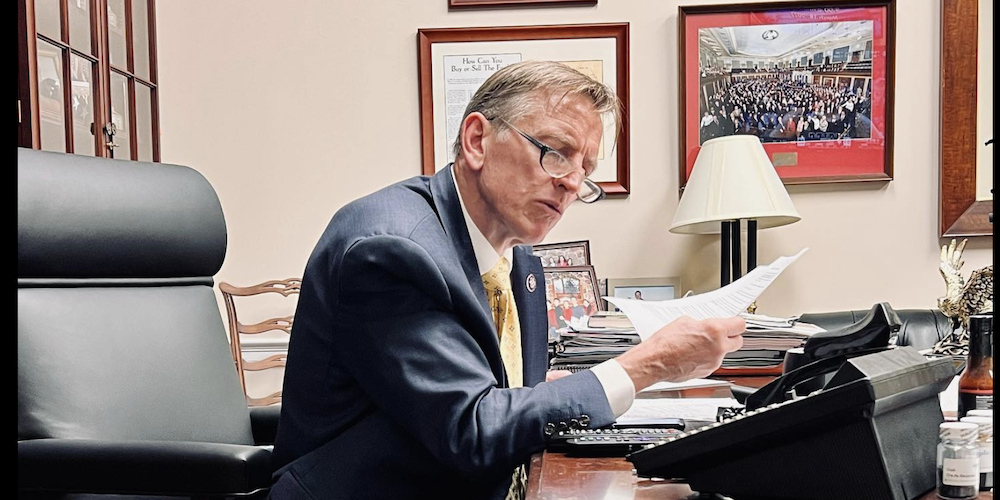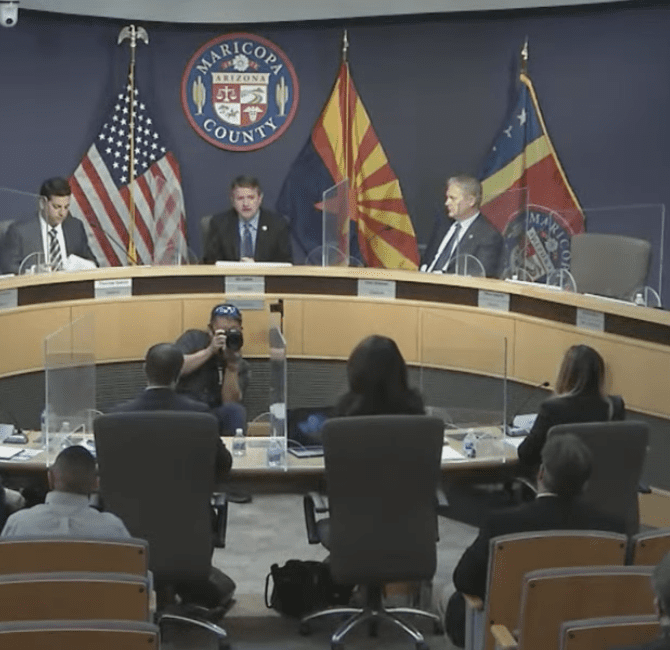Next January 6 Hearing: How Trump and Allies Pushed States to Overturn Results

(U.S. Rep. Paul Gosar, R-AZ, in his office. Image credit: facebook.com/repgosar/)
One day after Arizona’s 2020 presidential election, Donald Trump’s supporters, including armed protesters, converged on Maricopa County’s ballot counting center. That morning, a local congressman, Rep. Paul Gosar, R-AZ, had amplified Trump’s stolen election claims. He tweeted that Trump votes were uncounted in his state’s most populous county because many voters had used sharpie pens, which bled through the paper and spoiled their ballots.
Although the rumor, dubbed “Sharpie-gate,” was false, Gosar made a beeline for the protest. Rather than urging those present to accept disappointing results, he validated their fears. Gosar was not alone. Arizona Attorney General Mark Brnovich, another ambitious Republican – now running for the U.S. Senate as a “true conservative” – announced an investigation. These reactions, abusing their offices’ prestige and authority, were not unique.
Trump called Maricopa County’s top elected Republican to pressure him to stop counting votes. The Arizona Republican Party, like the GOP in many battleground states, filed baseless lawsuits. Later that month, Trump’s Washington-based lawyers, who knew that Joe Biden won, flew into Phoenix. They met with GOP legislators, who let them use Arizona’s statehouse as a stage for making more false claims. In December, loyalists from state party officials to legislators, forged and signed a fake Electoral College certificate saying that Trump had won. Then they lobbied the vice president to count their fraudulent and illegal votes on January 6.
The fourth hearing by the House Select Committee to Investigate the January 6 Attack on the U.S. Capitol will focus on how Trump’s team pressured local and state government officials to overturn Biden’s victory. Tuesday’s witnesses include two Republican election officials from Georgia and a state legislator from Arizona who resisted Trump’s pressure. They received numerous threats from Trump supporters that have continued into 2022.
The events in Arizona followed a template also seen in Georgia, Michigan, Pennsylvania, and Wisconsin, according to the panel’s disclosures and other reporting compiled by States United Democracy Center, a nonpartisan organization advancing free, fair, and secure elections.
“The same lies and conspiracy theories that fueled the January 6 attack contributed to threatening and violent messages aimed at election officials,” its Arizona update said. “These threats were launched over email, voicemails, texts, letters, social media, and in-person events, including gathering outside election officials’ homes.”
As the hearings continue, there are not only questions of what accountability will ensue for participants in Trump’s failed 2020 coup, but what can be done about Republicans who still embrace the stolen election lie. This past weekend, for example, the Texas Republican Party adopted these claims in its party platform. That action follows scores of election-denying candidates running for state and federal office in 2022 and winning their primaries.
“These candidates and their successful primary campaigns are a stark reminder that the insurrection—and the lies that sparked it—did not end on January 6, 2021 or when former President Trump left office,” wrote States United’s leadership team, Noman Eisen, Joanna Lydgate and Christine Todd Whitman (New Jersey’s ex-governor and a Republican) in Slate. “And they are proof that the kindling for the attack—and the continued stoking of the fire—is alive and well in the states.”
The trio contend that local accountability would have the greatest impact with stopping the cynical and dangerous stolen election claims. They suggest disbarring the “bad lawyers” who perpetuated the evidence-free falsehoods, which means ending their legal careers. They said that “district and county attorneys can bring criminal charges” against the coup’s participants and cited the investigation in Georgia’s Fulton County, where Trump tried to get Secretary of State Brad Raffensperger to “find” votes to reverse Biden’s victory. (Raffensperger and his deputy are witnesses on Tuesday.)
They further suggested that local prosecutors go after militias like the Proud Boys and Oath Keepers for confrontations with police, citing a lawsuit by the District of Columbia Attorney General Karl Racine. They also suggested that state attorneys general go after Trump’s post-election fundraising where false claims were used to dupe donors, citing a Michigan inquiry that’s underway and a possible New York State investigation.
“Democracy cannot exist without the rule of law,” they wrote. “Seeking accountability for those who step outside those bounds is critical to stopping the ongoing insurrection before it’s too late. If we want to prevent an election hijack in 2022 and 2024, it’s going to take a full-speed-ahead approach to accountability. And just like with our elections, we believe those [accountability efforts] will be run and led by the states.”
Tuesday’s disclosures may suggest which legal venues would be best for seeking accountability.
But there is another aspect of accountability that involves understanding and confronting the dysfunctional political psychologies that enabled this crisis. Pro-Trump politicians, candidates and campaigners seem to share a mindset where they valued obtaining power above other personal, public, and professional considerations. It’s one thing to be a loyal and ambitious politician. It’s another to mimic party leaders who lie, show indifference to facts, embrace chaos and violence, bilk supporters, and say such actions were patriotic — and still are.
The hearings are revealing how far people who admired or envied Trump were willing to go. As new details surface so too are suggestions for how and where to hold participants accountable. But what has not yet been revealed is what might excise the dynamic in political life that allows such self-serving people to advance, and, as just seen in Texas, to keep lying.






